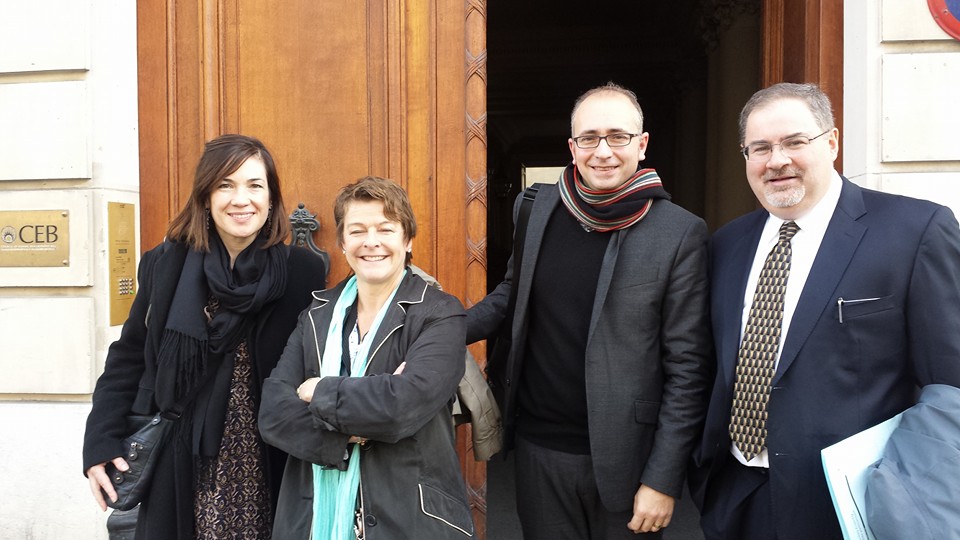Date:
3 December 2015
Location:
Paris, France
Helen Darbishire, Executive Director of Access Info Europe, participated in a three-hour hearing of the Parliamentary Assembly of the Council of Europe today in Paris to discuss the role of access to information and investigative journalism in the fight against corruption.
» Strengthen access to information laws
In her presentation Helen Darbishire focused on the need to strengthen access to information laws, noting that while 42/47 Council of Europe countries do have such laws, many are very weak. She singled out the need for law reform in Austria, Italy and Greece, and noted that Cyprus and Luxembourg are still without this essential anti-corruption tool.
One specific recommendation was that all countries in the Council of Europe region sign and ratify the Convention on Access to Official Documents, ensuring that their laws are in line with this international standard. This would mean, for example, that France and Germany should ensure that all exceptions to the right are subject to a public interest test
» Open up Company Registers
Darbishire also pointed to the need to open up Company Registers. She presented research from Access Info and the Organised Crime and Corruption Reporting Project that has found that across Europe only the UK and Danish Company Registers are available free of charge, whereas prices range from around €75,000 in the Netherlands to around €250,000 in Estonia. More on Access Info’s research can be found here.
As EU countries transpose the 4th Anti Money Laundering Directive it will be essential that they provide for public access to beneficial ownership information. She gave the example of a recent scandal in Moldova where journalists investigating a huge €1 billion money laundering scandal were unable to trace the owners of a UK-registered company because the beneficial owners are hidden behind other companies registered in the Seychelles. Parliamentarians can play an important role during the transposition of the EU Directive by defending public access to beneficial ownership data.
» Parliamentary Questions
When asked to address how parliamentarians can help journalists and civil society in the fight against corruption, Darbishire pointed to the possibility of using parliamentary questions to obtain information that has been refused under access to information laws or is only otherwise available by leaks. An example of this came from Spain where a parliamentarian asked for and obtained access to a report on implementation of the UN Convention against Corruption after the government had refused to provide it following a request for information.
» Parliaments Leading by Example
Parliaments can also lead by example on transparency matters. Darbishire presented the recent case of journalists from the 28 EU countries taking the European Parliament to court over the refusal to provide details on the expenses of MEPs. Responding to a question from a Germany parliamentarian, she noted that the German parliament is not under the FOI law and this is something that should be changed to bring the German law into line with recognition by the UN and European Court of Human Rights of a fundamental right of access to information.
» Independent Oversight Bodies
Ensuring that oversight bodies such as information commissioners and anti-corruption authorities are genuinely independent, that they have a strong mandate, and that they are allocated with sufficient budgetary resources to carry out their work is something that parliamentarians can also support, noted Darbishire during the debate.
The other participants in the PACE hearing were:
Ms Margo Smit, Ombudsman at Dutch public broadcaster NOS, Journalism teacher at the State University of Groningen, Netherlands
Mr Drew Sullivan, Organized Crime and Corruption Reporting Project (OCCRP), Sarajevo
Mr Ricardo Gutierrez, General Secretary, European Federation of Journalists (EFJ), Brussels
The debate also addressed the need for an ecosystem protective of investigative journalism, which should include appropriately framed civil defamation laws, a balance between protection of privacy and freedom of expression and freedom of information, and strong protection for whistleblowers.
The event’s draft agenda is available here: ![]()
More information on this event can be found here:
http://europeanjournalists.org/fr/2015/12/03/il-faut-proteger-la-liberte-dexpression-et-promouvoir-le-journalisme-dinvestigation/

